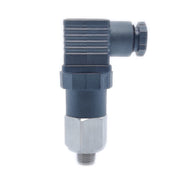Pressure gauges are essential for safe and effective operations in many different sectors. These apparatuses gauge the pressure of liquids or gases inside hermetically sealed systems. Let's examine the reasons why pressure gauges are essential in a variety of industries.
Oil and Gas Industry: Pressure gauges serve as the industry's equivalent of eyes keeping a watch on the vital signs of operations. They support the maintenance of ideal pressure levels in equipment and pipes, guard against leaks, and guarantee smooth operation.
Manufacturing Facilities: In manufacturing facilities, pressure gauges serve as the defenders of quality control. By guaranteeing that machinery functions within predetermined pressure limits, they support reliable product quality and safety.
Chemical Processing: Accurate pressure control is necessary in chemical facilities. Pressure gauges give operators immediate input so they may make process adjustments and avoid mishaps or equipment damage.
Food Processing: By controlling pressure at different points in the manufacturing process, pressure gauges let dairy farms and brewers guarantee the safety of their products. They support the integrity of the product and aid in keeping things hygienic.
Pharmaceutical Industry: Precision is a must in the production of pharmaceuticals. Pressure gauges guarantee that crucial procedures, such as filtering and sterilizing, take place under ideal circumstances and meet stringent quality requirements.
Power Generation: Steam pressure in boilers and turbines keeps track of pressure gauges in power plants. In addition to improving the energy economy, proper pressure management lowers the chance of equipment failure.
Types of Pressure Gauges
Pressure gauges are essential tools used in many different sectors to monitor and regulate system pressure levels. Mechanical pressure gauges and electronic pressure gauges are the two primary categories, and each has unique types and functions.
A. Mechanical Pressure Gauges
One of the most often used mechanical gauges is the Bourdon tube gauge, which uses a curved tube that straightens under pressure to move a pointer around a dial. They are strong, dependable, and appropriate for a variety of uses, including industrial and automotive.
Diaphragm gauges: These gauges use a diaphragm that is flexible and deforms when subjected to pressure, converting the force into a mechanical displacement. Diaphragm gauges are frequently employed in applications demanding accuracy, such as laboratory equipment, and are excellent for measuring low to moderate pressures.
Bellows Gauges: A foldable metal bellows that expands or contracts in response to pressure variations that occur in bellows gauges. Because of their great sensitivity and precision, they are appropriate for demanding applications like the aerospace and pharmaceutical sectors, where accurate pressure monitoring is crucial.
B. Electronic Pressure Gauges
Piezoelectric Pressure Sensors: These instruments detect pressure by using the piezoelectric effect. Piezoelectric materials produce an electric charge in direct proportion to the pressure they face up to. Their quick reaction times and exceptional precision make them popular in sectors like medical and automotive devices that need to measure pressure in real-time.
Strain gauge: Strain gauge transducers are pressure transducers that measure strain by attaching strain gauges to a flexible diaphragm. The strain gauges translate the resistance, which changes as pressure deforms the diaphragm, into an electrical signal that is proportionate to the pressure. They are adaptable and extensively utilized in several industry applications, including HVAC systems and hydraulic systems.
Comparison of Different Types Based on Usage and Functionality
Several considerations need to be made when deciding which kind of pressure gauge to employ, including the application requirements, accuracy, dependability, and cost.
Accuracy: When compared to mechanical gauges, electronic pressure gauges usually have a higher degree of precision, which makes them appropriate for applications needing exact pressure measurement.
Electronic pressure gauges are perfect for dynamic systems that experience sudden changes in pressure because of their quicker reaction times.
Cost: Electronic pressure gauges may provide long-term cost advantages due to their improved accuracy and dependability, which lower maintenance and downtime costs. The mechanical pressure gauges are often more economical upfront.
Environment: Harsh locations with frequent exposure to severe temperatures, vibrations, or corrosive chemicals may be better suited for mechanical gauges.
The Most Commonly Used Pressure Gauge

In several sectors, the Bourdon tube gauge is the standard pressure gauge. The bent tube in this mechanical device straightens as pressure applies, showing pressure levels on a dial.
Reasons for its widespread usage
Its ease of use, dependability, and adaptability are the reasons for its extensive use. The sturdy design and precise measurement of a broad range of pressures are hallmarks of Bourdon tube gauges.
Industries where it is predominantly employed
Many sectors, including manufacturing, chemical processing, oil and gas, and automotive, use this trustworthy gauge. It is a standard in settings where accurate pressure monitoring is crucial because of its versatility.
Advantages and limitations
The Bourdon tube gauge has the qualities of being accurate, long-lasting, and user-friendly. It's real-time pressure measurements and low maintenance requirements improve operating efficiency.
It is not without restrictions, though. When specialized gauges are necessary for exceptionally high or low-pressure applications, Bourdon tube gauges might not be as appropriate. Furthermore, vibration and temperature changes may have an effect on them, which might decrease accuracy.
Last Remarks
One cannot exaggerate the importance of pressure gauges in all businesses. These essential tools guarantee security, streamline procedures, and uphold quality requirements. Pressure gauges are protectors that control pressure levels and avert possible catastrophes in a variety of industries, including manufacturing, oil & gas, and pharmaceuticals. Purchasing top-notch pressure gauges is crucial for smooth operations and staff and asset protection.



Leave a comment